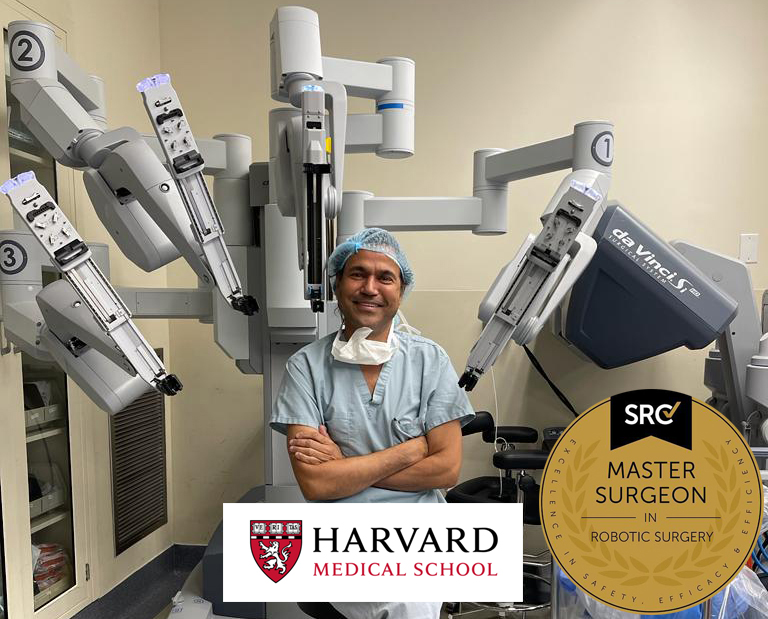Endometriosis Specialist NYC
Our highly-rated endometriosis specialist emphasizes delivering a thorough and cautious treatment approach that addresses all the requirements of women with endometriosis.
Endometriosis is a chronic and often painful condition where tissue similar to the lining of the uterus, called the endometrium, grows outside the uterus. This abnormal growth can occur in various areas of the reproductive system, such as the ovaries, fallopian tubes, and pelvic cavity, and even spread to other organs in rare cases. With each menstrual cycle, the displaced endometrial tissue thickens, breaks down, and bleeds, leading to inflammation, scar tissue formation, and adhesions.
This can result in symptoms like pelvic pain, painful periods, pain during intercourse, infertility, and digestive or urinary problems. Endometriosis is a complex condition that requires proper diagnosis and individualized treatment approaches to manage its symptoms and improve the quality of life for those affected.
It is believed that around 10% of women of reproductive age worldwide have endometriosis.
Our Approach
At New York Gynecology Endometriosis (NYGE), our highly-rated surgeon, Dr. Pankaj Singhal, specializes in endometriosis and conducts a comprehensive evaluation to determine the underlying cause of your pain. Once the sources of pain are identified, we provide a tailored multidisciplinary treatment approach to address your specific medical issues, goals, and ideals.
Our range of options includes surgical, medical, and alternative approaches, ensuring a diverse selection for your consideration. We understand the debilitating nature of endometriosis and strive to assist you in achieving a pain-free life.
Conditions We Treat
At NYGE, we address a range of endometriosis and other related conditions, including:
Evaluation
The evaluation of endometriosis typically involves a combination of medical history assessment, physical examination, and diagnostic tests. Here is a general outline of our evaluation process:
- Medical History: Our endometriosis specialist will discuss your symptoms, menstrual history, and any relevant medical conditions. Providing detailed information about your pain patterns, severity, and associated symptoms can help in the evaluation.
- Physical Examination: A pelvic examination may be conducted to check for abnormalities, tenderness, or masses in the pelvic region. This examination can provide preliminary indications of endometriosis, although it cannot confirm the diagnosis definitively.
- Imaging Studies: Various imaging techniques like ultrasound or MRI may be recommended to visualize the pelvic organs and identify any potential endometriotic lesions, cysts, or other abnormalities.
- Laparoscopy: This is the gold standard for diagnosing endometriosis. It is a minimally invasive surgical procedure where a small camera (laparoscope) is inserted through a small incision in the abdomen. Our surgeon examines the pelvic organs directly, looking for endometriotic implants, adhesions, and cysts. If detected, these can be biopsied or treated during the same procedure.
It’s important to note that the evaluation process may vary depending on the individual case and the surgeon’s preferences. Consulting with an endometriosis specialist is crucial for an accurate diagnosis and appropriate treatment planning.

Treatment Services
Medications
Multiple treatment options are available to alleviate the painful symptoms of endometriosis, with hormonal therapies being highly effective in providing relief.
Commonly prescribed medications for alleviating endometriosis symptoms include the following:
- Nonsteroidal Anti-Inflammatory Drugs (NSAIDs): NSAIDs such as ibuprofen or naproxen sodium are often recommended to reduce pain and inflammation associated with endometriosis.
- Hormonal Contraceptives: Birth control pills, patches, or vaginal rings containing estrogen and progestin are commonly used to regulate menstrual cycles and reduce pain caused by endometriosis.
- Gonadotropin-Releasing Hormone (GnRH) Agonists and Antagonists: These medications temporarily induce a state similar to menopause, suppressing ovarian function and reducing estrogen levels. This can help shrink endometriotic lesions and alleviate symptoms.
- Progestin Therapy: Progestin-only medications, such as oral contraceptives or intrauterine devices (IUDs), can be used to manage pain and prevent the growth of endometrial tissue outside the uterus.
- Aromatase Inhibitors: These medications work by blocking the production of estrogen in the body, which can help reduce the growth of endometriotic tissue.
Surgery
If medication fails to provide sufficient pain relief or if a definitive diagnosis of endometriosis is desired, surgical intervention may be necessary.
Surgery is also recommended for cases of more severe disease with larger endometriotic implants and involvement of nearby organs. Our skilled endometriosis specialists in NYGE specialize in both laparoscopic and robotic procedures, yielding outstanding outcomes and high patient satisfaction. We prioritize and respect each patient’s individual choices and goals regarding fertility and lifestyle factors.
Through collaborative decision-making, you and your surgeon will determine the most effective surgical approach.
Surgical options include the following:
- Diagnostic laparoscopy with biopsies, a common minimally invasive procedure for endometriosis diagnosis, involves inserting a laparoscope through a small abdominal incision to visualize pelvic organs, detect endometriotic lesions, adhesions, or cysts, and perform biopsies for confirmation, providing crucial information on the extent, location, and severity of endometriosis to inform subsequent treatment decisions.
- Laparoscopic or robotic excision is a surgical procedure used to remove endometriotic implants. This minimally invasive approach involves using a laparoscope or robotic-assisted technology to precisely locate and excise the endometriotic lesions, helping to alleviate pain and improve symptoms associated with endometriosis.
- Laparoscopic or robotic excision of deep infiltrating disease, which can involve the bowel and bladder.
- Abdominal wall endometriosis excision refers to the surgical removal of endometriotic lesions that have developed in the abdominal wall.
- Laparoscopic or robotic hysterectomy is a surgical procedure used to remove the uterus. This approach provides benefits such as smaller incisions, reduced scarring, and shorter recovery time compared to traditional open surgery.
- Laparoscopic or robotic ovarian cystectomy or removal is a surgical procedure performed to remove cysts from the ovaries using minimally invasive techniques.
- Open surgery is performed when a minimally invasive approach is not recommended or feasible. In certain cases, such as when there are complex adhesions, large tumors, or extensive disease, open surgery may be necessary to safely and effectively address the condition. This approach involves making a larger incision, providing the surgeon with better access to the affected area for a thorough examination and treatment.
Important Reminder
Endometriosis, a painful and debilitating inflammatory condition, can profoundly affect a woman’s quality of life. Nonetheless, natural remedies and lifestyle changes can serve as effective management strategies, offering symptom reduction and improved overall health with minimal risks.
If you have already explored natural remedies without experiencing symptom improvement, it is crucial to consult with your doctor for guidance on further steps in managing your condition. Leaving endometriosis untreated can have a significant impact on your daily life and well-being, so seeking appropriate medical advice is essential.
Latest Posts
- New York Gynecology Endometriosis
- Contact Info:
-
375 E. Main Street,
Suite 7, Bay Shore,
NY 11706 - (631) 533-9733
Pankaj Singhal, MD, MS, MHCM
Master Surgeon in Robotic Surgery
Dr. Pankaj Singhal, a globally recognized endometriosis surgeon, possesses over 25 years of expertise in laparoscopic excision surgery, enabling him to tackle even the most challenging endometriosis cases with confidence. Dr. Pankaj treats patients with diverse endometriosis-related conditions, ranging from ovarian endometriomas to severe deep infiltrating endometriosis that affects the bowels and other organs.
Dr. Pankaj prioritizes minimally invasive surgery and provides comprehensive personal care. Additionally, he is the owner and founder of New York Gynecology and Endometriosis (NYGE), and has dedicated his life to advocating for, respecting, and treating women suffering from this little-known disease. He is one of the few surgeons in the entire United States who have completed over 5,718 robot-assisted gynecologic surgeries.

We Accept Most Major Insurance Plans
Convenient Billing Options for Comprehensive Coverage
Request an Appointment with
New York Gynecology Endometriosis
"*" indicates required fields
